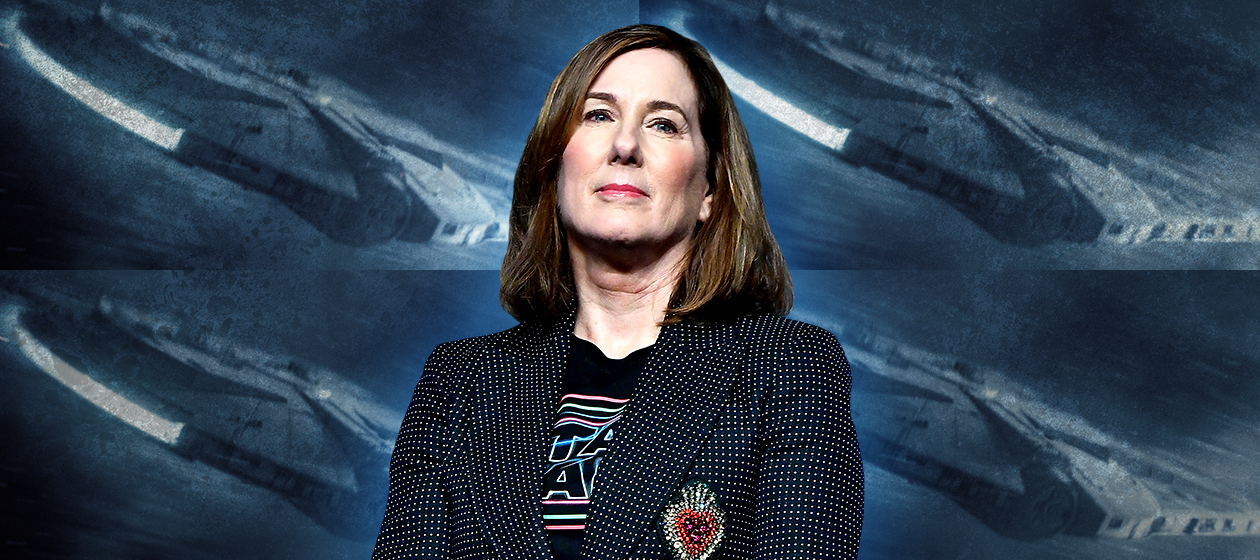Don't fire Kathleen Kennedy over Solo
The head of Lucasfilm is not the scapegoat you're looking for


A free daily email with the biggest news stories of the day – and the best features from TheWeek.com
You are now subscribed
Your newsletter sign-up was successful
You know times are strange when a film franchise that's earned $4 billion in less than three years feels like it's in jeopardy. So aggrieved are some Star Wars fans by behind-the-scenes missteps at Lucasfilm and by last year's divisive The Last Jedi that the disappointing box office receipts of Solo: A Star Wars Story, which is now expected to lose somewhere between $50 million to $80 million, feel downright apocalyptic for the brand. Never mind the critical and financial merits of the other Disney-era entries; in the hyperbolic hellscape of online film discourse, one minor dud spells doom.
At the center of this whirling controversy is Lucasfilm President Kathleen Kennedy, who many fans unfairly blame for all the franchise's perceived failures and want gone. But she's done nothing to warrant this level of abuse. Disney should keep her around.
To be fair, Star Wars fans have had a rough go of it. Since the original trilogy wrapped in the early '80s, the brand has undergone two wholly different rebirths. First, in the form of George Lucas' reviled prequel trilogy — which all but chased the creator away for good — and again when Disney scooped up Lucasfilm for a hefty $4.05 billion in 2012. Kennedy took the reins just before that purchase, during Star Wars' most transitional period, and is therefore in a precarious place: The wild success of The Force Awakens is her glory, and the controversial repercussions of the still incredibly successful The Last Jedi her burden. Fans and media outlets have accused her of lacking vision for the property, as evidenced by the hiring and subsequent firing of several would-be Star Wars directors, like Josh Trank, Phil Lord and Chris Miller, and Colin Trevorrow. The franchise's first standalone film, Rogue One, was rife with production problems, as was Solo. Many have also critiqued the lack of cohesion between Disney's entries; when The Last Jedi director Rian Johnson confessed he was allowed to do whatever he wanted with new characters like Rey, it drew ire from fans who expected a game plan for the episodic films.
The Week
Escape your echo chamber. Get the facts behind the news, plus analysis from multiple perspectives.

Sign up for The Week's Free Newsletters
From our morning news briefing to a weekly Good News Newsletter, get the best of The Week delivered directly to your inbox.
From our morning news briefing to a weekly Good News Newsletter, get the best of The Week delivered directly to your inbox.
As president of Lucasfilm, Kennedy is the natural target for angry fans, but the vitriol leveled at her is nonsensical when you consider the on-paper success of Disney-era Star Wars thus far. The Force Awakens and The Last Jedi were both the highest-grossing films of their given years, and both have over a 90-percent rating on Rotten Tomatoes. Rogue One was the second highest-grossing film of 2016 and a hit with critics. Even if Solo ends up a box office loser, it's one mark against an otherwise airtight track record, and speaks more to Disney-induced market saturation than a major creative fissure at Lucasfilm.
To think that Kennedy, one of the most esteemed and financially successful film producers of all time, is easily replaceable speaks to a true misunderstanding of Hollywood mechanics. Kennedy is, after all, the woman who produced her first film — a little picture called E.T., The Extra-Terrestrial — when she was 29 years old. That movie, you might recall, was the highest-grossing film of all time until it was dethroned by Jurassic Park — which Kennedy also produced. Who on Earth has more box office credibility than her?
That takes us back to the creative argument. Some — including entertainment outlet Collider — have suggested Kennedy stay on as president but hire a creative consultant to hash out a grand plan for the Star Wars franchise. Dave Filoni, head of Lucasfilm Animation, is a name that pops up a lot, as is Kevin Feige, who runs Marvel Studios. Both men have encyclopedic knowledge of their respective fandoms (as evidenced by Filoni's beloved animated series Star Wars: The Clone Wars and Star Wars Rebels, and by Feige's enthusiastic handling of the MCU). Feige also boasts a proven ability to build a franchise.
But holding these men up as the ideal arbiters of the Star Wars domain reveals another insidious facet to the Kathleen Kennedy backlash: her sex. Of course, not every Kennedy critic is motivated by sexism; some speak from a place of genuine concern for the brand they love, and they fret for its health in the money-eating Disney machine. But it cannot be denied that, in a certain corner of fandom, there is an attitude of mistrust that comes with Kennedy's power at Lucasfilm. Feige wasn't attacked like this by MCU fans after Joss Whedon public condemned Avengers: Age of Ultron's behind-the-scenes woes or when Edgar Wright left Ant-Man after nearly 10 years of pre-production work on the film. Nor have these incidents stopped the "Give Star Wars to Kevin Feige" campaigns on Twitter and YouTube.
A free daily email with the biggest news stories of the day – and the best features from TheWeek.com
Much of the vehement backlash against Kennedy has to do with what some fans perceive as the insertion of "SJW politics" into Star Wars, a franchise that — literally from the beginning — was about a minority military faction rebelling against a tyrannical, nationalist intergalactic government. Under Kennedy, Star Wars has grown into a more multicultural, female-driven franchise, which is thematically appropriate for the storytelling Lucas put in place — indeed, his original treatment for Episode VII also had Luke training a female protagonist, and his work was always about the disenfranchised rallying against racist, totalitarian ideologies. Lucas, an outspoken leftist, admitted to the Chicago Tribune that his initial inspiration for Star Wars was the Vietnam War, "and that was the period where Nixon was trying to run for a [second] term, which got me to thinking historically about how do democracies get turned into dictatorships? Because the democracies aren't overthrown; they're given away." All of that is to say that even if Kennedy were coming at Star Wars with a leftist agenda — which she's not — it would be the exact same agenda the franchise's creator infused in its DNA from the beginning.
Still, the bigger question remains: Is Kathleen Kennedy doing right by Star Wars?
That will, of course, depend on your definition of "right." Solo is a major studio disappointment, yes, but it's only the fourth new Star Wars film, and all signs point to Kennedy knowing it was going to be a stinker before its premiere; Disney didn't reveal a single second of footage until roughly four months before its release and it refused to nudge on the May release date despite those extensive reshoots and its proximity to The Last Jedi. It appears that the intent was to bury Solo and move on.
And though this new iteration of Lucasfilm isn't as meticulously laid out as the MCU, we forget that it doesn't have to be — these are different business models, with different intentions. The MCU had to introduce characters in individual films with the intention of linking them up eventually, but Star Wars anthologies have no such obligation. These are pre-existing characters, or brand new characters, who can occupy their own spaces without the burden of an Avengers-style meet-up. That frees up creative liability for the feature films, and leaves the continuity work for the Lucasfilm Story Group.
By that accord, Kennedy is doing just fine. But time will tell if the toxic online chatter poisons the well. Is the divisiveness of The Last Jedi the deal-breaker some say it is, and is Solo's underperformance indicative of a fan revolt? Or is it merely the result of franchise fatigue and a film even the diehards never really wanted to begin with?
A lot of responsibility rests on J.J. Abrams' upcoming Episode IX, which puts the filmmaker back in the same delicate spot he was with The Force Awakens: compelled to remind Star Wars fans why they love this galaxy to begin with. He can do it with the help of Kathleen Kennedy, the woman who helped him succeed on the first go-around, and the woman who deserves the title she's worked her entire life to achieve.
Disney, keep her around.
Lindsey Romain is a culture writer living in Austin, Texas. Her work has appeared in Vulture, Marie Claire, Thrillist, Vice, and Teen Vogue.
-
 How the FCC’s ‘equal time’ rule works
How the FCC’s ‘equal time’ rule worksIn the Spotlight The law is at the heart of the Colbert-CBS conflict
-
 What is the endgame in the DHS shutdown?
What is the endgame in the DHS shutdown?Today’s Big Question Democrats want to rein in ICE’s immigration crackdown
-
 ‘Poor time management isn’t just an inconvenience’
‘Poor time management isn’t just an inconvenience’Instant Opinion Opinion, comment and editorials of the day
